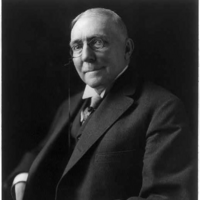Friday Afternoon
To William Morris Pierson
[1868-1870]
Of the wealth of facts and fancies
That our memories may recall,
The old school-day romances
Are the dearest, after all!—.
When some sweet thought revises
The half-forgotten tune
That opened 'Exercises’
On ‘Friday Afternoon.’
We seem to hear the clicking
Of the pencil and the pen,
And the solemn, ceaseless ticking
Of the timepiece ticking then;
And we note the watchful master,
As he waves the warning rod,
With our own heart beating faster
Than the boy’s who threw the wad.
Some little hand uplifted,
And the creaking of a shoe:—
A problem left unsifted
For the teacher’s hand to do:
The murmured hum of learning—
And the flutter of a book;
The smell of something burning,
And the school’s inquiring look.
The bashful boy in blushes;
And the girl, with glancing eyes,
Who hides her smiles, and hushes
The laugh about to rise,—
Then, with a quick invention,
Assumes a serious face,
To meet the words, ‘Attention!
Every scholar in his place!’
The opening song, page 20.—
Ah! dear old ‘Golden Wreath,’
You willed your sweets in plenty;
And some who look beneath
The leaves of Time will linger,
And loving tears will start,
As Fancy trails her finger
O’er the index of the heart.
'Good News from Home’—We hear it
Welling tremulous, yet clear
And holy as the spirit
Of the song we used to hear—
'Good news for me’ (A throbbing
And an aching melody)—
'Has come across the’—(sobbing,
Yea, and salty) ‘dark blue sea!’
Or the paean 'Scotland’s burning!'
With its mighty surge and swell
Of chorus, still returning
To its universal yell—
Till we’re almost glad to drop to
Something sad and full of pain—
And ‘Skip verse three,’ and stop, too,
Ere our hearts are broke again.
Then 'the big girls’ compositions,
With their doubt, and hope, and glow
Of heart and face,—conditions
Of 'the big boys’—even so,—
When themes of ‘Spring,’ and 'Summer’
And of ‘Fall,’ and 'Winter-time’
Droop our heads and hold us dumber
Than the sleigh-bell’s fancied chime.
Elocutionary science—
(Still in changeless infancy!)—
With its 'Cataline’s Defiance,'
And 'The Banner of the Free’:
Or, lured from Grandma’s attic,
A ramshackle 'rocker’ there,
Adds a skreek of the dramatic
To the poet’s ‘Old Arm-Chair.’
Or the 'Speech of Logan’ shifts us
From the pathos, to the fire;
And Tell (with Gessler) lifts us
Many noble notches higher.—
Till a youngster, far from sunny,
With sad eyes of watery blue,
Winds up with something ‘funny,’
Like ‘Cock-a-doodle-do!’
Then a dialogue—selected
For its realistic worth:—
The Cruel Boy detected
With a turtle turned to earth
Back downward; and, in pleading,
The Good Boy—strangely gay
At such a sad proceeding—
Says, ‘Turn him over, pray!’
So the exercises taper
Through gradations of delight
To the reading of ‘The Paper,’
Which is entertaining—quite!
For it goes ahead and mentions
‘If a certain Mr. O.
Has serious intentions
That he ought to tell her so.’
It also ‘Asks permission
To intimate to ’John’
The dubious condition
Of the ground he’s standing on’;
And, dropping the suggestion
To 'mind what he’s about,'
It stuns him with the question:
'Does his mother know he’s out?'
And among the contributions
To this 'Academic Press’
Are 'Versified Effusions’
By—'Our lady editress’—
Which fact is proudly stated
By the CHIEF of the concern,—
‘Though the verse communicated
Bears the pen-name ’Fanny Fern.' '
. . . . . .
When all has been recited,
And the teacher’s bell is heard,
And visitors, invited,
Have dropped a kindly word,
A hush of holy feeling
Falls down upon us there,
As though the day were kneeling,
With the twilight for the prayer.
. . . . . .
Midst the wealth of facts and fancies
That our memories may recall,
Thus the old school-day romances
Are the dearest, after all!—
When some sweet thought revises
The half-forgotten tune
That opened ‘Exercises,’
On ‘Friday Afternoon.’

